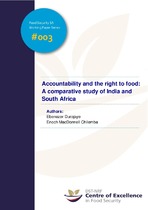| dc.contributor.author | Durojaye, Ebenezer | |
| dc.contributor.author | Chilemba, Enoch MacDonnell | |
| dc.date.accessioned | 2019-10-14T06:39:09Z | |
| dc.date.available | 2019-10-14T06:39:09Z | |
| dc.date.issued | 2018 | |
| dc.identifier.citation | Durojaye, E. and Chilemba, E.M. (2018). “Accountability and the right to food: A comparative study of India and South Africa”. Food Security SA Working Paper Series No. 003. DST-NRF Centre of Excellence in Food Security, South Africa. | en_US |
| dc.identifier.uri | http://hdl.handle.net/10566/5032 | |
| dc.description.abstract | It remains a great source of concern that, as richly endowed as the world is, each day millions of people go to sleep hungry and almost 870 million people, particularly in developing countries, are chronically undernourished. Also, every year, 6 million children die, directly or indirectly, from the consequences of undernourishment and malnutrition – that is, 1 child every 5 seconds. The international community at various forums in the last twenty years or so have committed to ending undernourishment in the world. The right to adequate food is guaranteed in a number of international and regional human rights instruments.
Despite these developments, many countries have not lived up to their obligations to realise this right. South Africa and India provide an interesting comparison. On one hand, South Africa has a progressive constitution that explicitly guarantees the right to food, while the Indian Constitution does not recognise the right to food as justiciable right. Yet the Indian courts have developed rich jurisprudence to hold the government accountable for failing to realise the right to food of the people. Indeed the courts have played key roles in ensuring the judicialisation of the right to adequate food in India in the wake of the fact that the Constitution does not expressly set out the right.
This report shows that South Africa can learn from the Indian experience by using litigation as a tool for holding the government accountable to its obligation under international and national laws. Besides litigating the right to food to hold the government accountable, it is noted that chapter 9 institutions such as the South African Human Rights Commission (SAHRC), the Gender Equality Commission and the Public Protector all have important roles to play in holding the government accountable to the realisation of the right to food. This is because these institutions are constitutionally empowered to monitor and report on the measures and steps taken by the government towards the realisation of socioeconomic rights, including the right to food under the Constitution.
The report concludes by noting that civil society groups in South Africa will need to be more active in monitoring steps and measures adopted by the government to realise the right to food. It also notes that, where necessary, litigation can be employed as a useful strategy to hold the government to account for its obligation to realise the right to food. | en_US |
| dc.description.sponsorship | Centre of Excellence in Food Security | en_US |
| dc.language.iso | en | en_US |
| dc.publisher | Food Security SA Working Paper Series | en_US |
| dc.relation.ispartofseries | 003; | |
| dc.subject | Accountability | en_US |
| dc.subject | Right to food | en_US |
| dc.subject | Judiciliasation | en_US |
| dc.subject | South Africa | en_US |
| dc.subject | India | en_US |
| dc.title | Accountability and the right to food: A comparative study of India and South Africa | en_US |

